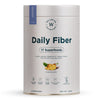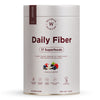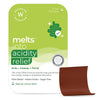Dietary fiber is a type of carbohydrate found in plant-based foods that the body can’t digest. Unlike other carbs that are broken down into sugar, fiber moves through the digestive tract relatively intact, doing essential behind-the-scenes work. It helps regulate digestion, supports a healthy gut microbiome, and may even help reduce acid reflux and heartburn.
There are two main types of fiber: soluble and insoluble, and both are important, especially when it comes to managing acid reflux and heartburn. While one helps slow digestion and soothe the stomach, the other keeps things moving. Together, they create a strong foundation for better gut health and long-term relief from acidity to more chronic issues like GERD.
GERD, and Why Does It Happen?
Gastroesophageal reflux disease, commonly known as GERD, is a condition in which stomach acid flows back into the esophagus, often leading to discomfort in the form of acid reflux and heartburn. It’s more than just occasional indigestion—it can become chronic, disrupt your meals, and even affect your sleep.
Common symptoms of acid reflux include:
-
A burning sensation in the chest (especially after meals)
-
Regurgitation of food or sour liquid
-
A lump-in-the-throat feeling
-
Bloating and burping
-
Nausea
This typically happens when the lower esophageal sphincter (LES), the valve-like muscle that seals off the stomach from the esophagus, becomes weak or relaxed at the wrong time. When the LES doesn’t close properly, acid from the stomach can creep upward, causing that all-too-familiar burn.
Role of Fiber in Managing Acid Reflux
Can fiber help prevent acid reflux and heartburn? In many cases, yes. Research shows that a fiber-rich diet can significantly reduce the frequency of reflux episodes. [NIH] Here’s how fiber supports digestive health and helps keep acidity in check:
-
Promotes satiety: Fiber slows down digestion, helping you feel full sooner. This can prevent overeating, which is a common trigger for acid reflux. [NIH]
-
Lowers stomach pressure: By supporting regular bowel movements, fiber helps reduce intra-abdominal pressure—ultimately easing the burden on the lower esophageal sphincter (LES).
-
Improves LES function: Some studies suggest that fiber may help strengthen and support proper functioning of the LES, reducing the chances of stomach acid moving upward. [NIH]
-
Enhances gut motility: A balanced intake of fiber keeps things moving smoothly through the digestive system, which helps prevent acid buildup and reflux.[NIH]
Soluble vs. Insoluble Fiber: Which One Matters More?
Both types of fiber are important, but when it comes to acid reflux, they play different roles.
Soluble fiber slows down digestion and forms a soothing gel-like substance in the digestive tract. This helps regulate how food and acid move through the stomach and into the intestines, making it particularly beneficial for those dealing with heartburn or a sensitive gut.
Insoluble fiber, on the other hand, adds bulk to the stool and speeds up the movement of food through the digestive system. While this is essential for regularity, too much insoluble fiber, especially from raw vegetables or rough grains, can sometimes aggravate symptoms in people with sensitive stomachs. It's all about balance and knowing your own tolerance levels.
High-Fiber Food Options
If you're looking to naturally manage fiber and acid reflux, the first step is incorporating gut-friendly, fiber-rich foods into your daily meals. The key is to choose foods that are both nourishing and gentle on your digestive system.
Here are some options to consider:
1. Oats
A warm bowl of oatmeal is a classic breakfast choice for a reason. It's high in soluble fiber and low in fat, making it ideal for reducing acid reflux symptoms. Add a few slices of ripe banana or a sprinkle of chia seeds for an extra fiber boost.
2. Bananas
Mild, non-acidic, and rich in soluble fiber, bananas are often well tolerated by sensitive stomachs. They're also known to help coat the esophageal lining and soothe irritation.
3. Sweet Potatoes
Sweet potatoes are packed with insoluble fiber, vitamins, and complex carbs that support digestion. They're gentle when cooked and help bulk up the stool without triggering acid production.
4. Carrots & Root Vegetables
Cooked carrots, beets, and parsnips are excellent sources of fiber for acidity management. Roasting or steaming them makes them easier on the stomach.
5. Apples
While raw apple skins can be rough, peeled apples provide a good dose of soluble fiber and antioxidants without being too harsh on the gut. Stewed apples with cinnamon are especially gentle and satisfying.
6. Chia and Flaxseeds
When soaked, these seeds create a gel-like texture that mimics soluble fiber. They can help slow digestion and support smooth gut motility. Add them to smoothies or oatmeal.
7. Whole Grains like Brown Rice and Quinoa
These are great sources of both fiber types and are less likely to cause bloating compared to refined grains. They’re also neutral in acidity, making them safe for sensitive stomachs.
8. Papaya
This tropical fruit is not only rich in fiber but also contains digestive enzymes like papain that support healthy digestion and reduce inflammation.
When it comes to fiber-rich foods, aim to prepare them in ways that are gentle on the gut—think steamed, baked, or stewed rather than fried or heavily spiced.
Smart Gut Support
Even with a balanced, fiber-rich diet, it’s not always easy to meet your daily fiber needs—especially when life gets hectic or your gut feels extra sensitive. That’s where Wellbeing Nutrition’s clean and natural gut health solutions help.
Our Daily Fiber supplements, made with a synergistic blend of natural prebiotic fibers, help fill the fiber gap and promote smoother digestion. Thoughtfully formulated with both soluble and insoluble fibers, they also include soothing botanical extracts like fennel, ginger, caraway, and aloe vera to calm your gut and support overall digestive wellness.
For those moments when acidity and heartburn strike, our Acidity Relief offers fast-acting, natural support. Infused with time-tested herbs like licorice, cinnamon, and amla, this blend works to neutralize excess acid and bring quick comfort without compromising on natural ingredients.
Together, these gut-focused supplements from Wellbeing Nutrition make it easier to maintain digestive harmony, support gut-brain balance, and stay one step ahead of acidity—naturally.
Final Thoughts
If you’ve ever wondered, “Can fiber prevent acid reflux and heartburn?”—both science and real-world experience say yes. But here’s the key: It’s not just about eating more fiber; it’s about choosing the right kind, in the right form, and pairing it with mindful gut support.
By combining a fiber-rich diet with targeted digestive supplements from Wellbeing Nutrition, you’re giving your gut exactly what it needs to function at its best. Because when your gut is in balance, everything from digestion to mood flows more smoothly.
FAQs
1. What type of fiber is best for acid reflux?
Both soluble and insoluble fiber are important for managing acid reflux. Soluble fiber soothes the digestive tract and helps regulate acid movement, while insoluble fiber supports regular bowel movements and reduces pressure on the stomach. A balanced mix of both can ease reflux symptoms and support overall gut health.
2. Can increasing fiber intake reduce heartburn symptoms?
Yes, increasing your fiber intake can help reduce the frequency and intensity of heartburn symptoms. Fiber promotes satiety, prevents overeating (a common reflux trigger), reduces stomach pressure, improves lower esophageal sphincter (LES) function, and supports smoother digestion—all of which contribute to fewer reflux episodes.
3. How much fiber should I eat daily to help with acid reflux?
While the blog doesn’t mention an exact number, general dietary guidelines recommend around 18-25 grams of fiber per day for adults. Focus on gradually increasing your intake through gut-friendly, fiber-rich foods like oats, bananas, sweet potatoes, and chia seeds, and observe how your body responds—especially if you have a sensitive stomach.
4. Are fiber supplements safe for managing acid reflux?
Yes, fiber supplements can be a safe and effective option, especially if you're not meeting your daily fiber needs through food alone. The key is to choose clean, natural supplements that combine both soluble and insoluble fibers with soothing botanicals. Wellbeing Nutrition’s Daily Fiber is formulated with this in mind, supporting smoother digestion and reducing acidity without irritating the gut.































